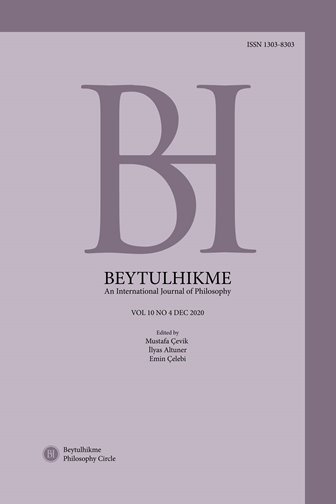Author :
Abstract
Makale, yaşam hakkının türevi olarak ölme hakkı sorununu ele almaktadır. Yazar, bu tür sorulara cevap ararken sorunlu, sistematik, disiplinler arası ve tanımlayıcı yaklaşımlar kullanır: 1) Herhangi bir yaşamın değeri var mı? 2) modern toplum yaşamak için kimin iddialarını garanti etmeli? 3) sadece yaşam hakkından değil, aynı zamanda ölme hakkından da bahsetmek uygun mudur? Bu amaçla, P. Singer, J. McMahan ve M. Tooley'nin faydacı konumu çoğunlukla analiz edilir. “Yaşamın kutsallığı” anlayışının birkaç temsilcisi rakipleri haline gelir. Yazar, 1) yaşamı mutlak veya ontik bir iyilik olarak sorguladıklarında ölme hakkı hakkında konuştukları sonucuna varır; 2) bir alternatif, hakların düzeyleri arasında ayrım yapmak ve tezahürlerini değil, kişilere saygı duymak olabilir. Sonuçta, farklı bir değer anlayışı anlaşmazlığın özünde yer almaktadır.
Keywords
Abstract
The article deals with the problem of the right to die as the derivative of the right to life. The author uses problematic, systematic, interdisciplinary, and descriptive approaches when she is looking for answers to such questions: 1) does any life have value? 2) whose claims to live should modern society guarantee? 3) is it appropriate to speak not only of the right to life but also of the right to die? For this purpose, the utilitarian position of P. Singer, J. McMahan, and M. Tooley is mostly analyzed. Several representatives of the “sanctity of life” conception become their opponents. The author concludes that 1) they speak about the right to die when they question life as an absolute or ontic good; 2) an alternative may be to distinguish between the levels of rights and to respect the persons, not their manifestations. Eventually, a different understanding of values is at the core of the disagreement.
Keywords
- Chańska, W. (2009). Nieszczęsny dar Życia: Filozofia i Etyka Jakości Życia w Medycynie Współczesnej. Wrocław: Wydawnictwo Uniwersytetu Wrocławskiego.
- Ciach, H. (2003). Istota Ludzka czy Osoba Ludzka. Krytyka Bioetyki Początków Życia Petera Singera. Kraków: Wydawnictwo Św. Stanisława BM.
- Feldman, F. (1992). Confrontations with the Reaper: A Philosophical Study of the Nature and Value of the Death. New York: Oxford University Press.
- May, W. E. (2003). Catholic Bioethics and the Gift of Human Life. Hungtington, Indiana: Our Sunday Visitor.
- McMahan, J. (2002). The Ethics of Killing: Problems at the Margins of Life. Oxford: Oxford University Press.
- Ochmański, W. (2007). Eutanazja nie Jest Alternatywą. Kraków: Wydawnictwo Salwator.
- Singer, P. (1999). Practical Ethics. Cambridge: Cambridge University Press.
- Tooley, M. (1972). Abortion and Infanticide. Philosophy and Public Affairs, 2, 37-65.
- Walter, J. J. (2005). The Meaning and Validity of Quality of Life Judgments in Contemporary Roman Catholic Medical Ethics. Contemporary Issues in Bioethics: A Catholic Perspective. (Eds. J. J. Walter & T. A. Shannon). Lanham: Rowman & Littlefield Publishers, 209-221. Öz: Makale, yaşam hakkının türevi olarak ölme hakkı sorununu ele almaktadır. Yazar, bu tür sorulara cevap ararken sorunlu, sistematik, disiplinler arası ve tanımlayıcı yaklaşımlar kullanır: 1) Herhangi bir yaşamın değeri var mı? 2) modern toplum yaşamak için kimin iddialarını garanti etmeli? 3) sadece yaşam hakkından değil, aynı zamanda ölme hakkından da bahsetmek uygun mudur? Bu amaçla, P. Singer, J. McMahan ve M. Tooley'nin faydacı konumu çoğunlukla analiz edilir. “Yaşamın kutsallığı” anlayışının birkaç temsilcisi rakipleri haline gelir. Yazar, 1) yaşamı mutlak veya ontik bir iyilik olarak sorguladıklarında ölme hakkı hakkında konuştukları sonucuna varır; 2) bir alternatif, hakların düzeyleri arasında ayrım yapmak ve tezahürlerini değil, kişilere saygı duymak olabilir. Sonuçta, farklı bir değer anlayışı anlaşmazlığın özünde yer almaktadır. Anahtar Kelimeler: Bilinç, haysiyet, iyilik, insan, yaşama hakkı, ölme hakkı.





